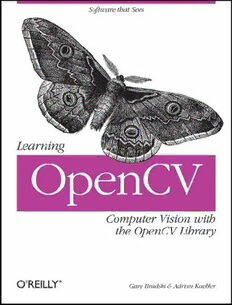Download Learning OpenCV: Computer Vision with the OpenCV Library PDF Free - Full Version
Download Learning OpenCV: Computer Vision with the OpenCV Library by Gary Bradski, Adrian Kaehler in PDF format completely FREE. No registration required, no payment needed. Get instant access to this valuable resource on PDFdrive.to!
About Learning OpenCV: Computer Vision with the OpenCV Library
"This library is useful for practitioners, and is an excellent tool for those entering the field: it is a set of computer vision algorithms that work as advertised." -William T. Freeman, Computer Science and Artificial Intelligence Laboratory, Massachusetts Institute of Technology Learning OpenCV puts you in the middle of the rapidly expanding field of computer vision. Written by the creators of the free open source OpenCV library, this book introduces you to computer vision and demonstrates how you can quickly build applications that enable computers to "see" and make decisions based on that data. Computer vision is everywhere-in security systems, manufacturing inspection systems, medical image analysis, Unmanned Aerial Vehicles, and more. It stitches Google maps and Google Earth together, checks the pixels on LCD screens, and makes sure the stitches in your shirt are sewn properly. OpenCV provides an easy-to-use computer vision framework and a comprehensive library with more than 500 functions that can run vision code in real time. Learning OpenCV will teach any developer or hobbyist to use the framework quickly with the help of hands-on exercises in each chapter. This book includes: A thorough introduction to OpenCV Getting input from cameras Transforming images Segmenting images and shape matching Pattern recognition, including face detection Tracking and motion in 2 and 3 dimensions 3D reconstruction from stereo vision Machine learning algorithms Getting machines to see is a challenging but entertaining goal. Whether you want to build simple or sophisticated vision applications, Learning OpenCV is the book you need to get started.
Detailed Information
| Author: | Gary Bradski, Adrian Kaehler |
|---|---|
| Publication Year: | 2008 |
| ISBN: | 9780596516130 |
| Pages: | 571 |
| Language: | English |
| File Size: | 10.161 |
| Format: | |
| Price: | FREE |
Safe & Secure Download - No registration required
Why Choose PDFdrive for Your Free Learning OpenCV: Computer Vision with the OpenCV Library Download?
- 100% Free: No hidden fees or subscriptions required for one book every day.
- No Registration: Immediate access is available without creating accounts for one book every day.
- Safe and Secure: Clean downloads without malware or viruses
- Multiple Formats: PDF, MOBI, Mpub,... optimized for all devices
- Educational Resource: Supporting knowledge sharing and learning
Frequently Asked Questions
Is it really free to download Learning OpenCV: Computer Vision with the OpenCV Library PDF?
Yes, on https://PDFdrive.to you can download Learning OpenCV: Computer Vision with the OpenCV Library by Gary Bradski, Adrian Kaehler completely free. We don't require any payment, subscription, or registration to access this PDF file. For 3 books every day.
How can I read Learning OpenCV: Computer Vision with the OpenCV Library on my mobile device?
After downloading Learning OpenCV: Computer Vision with the OpenCV Library PDF, you can open it with any PDF reader app on your phone or tablet. We recommend using Adobe Acrobat Reader, Apple Books, or Google Play Books for the best reading experience.
Is this the full version of Learning OpenCV: Computer Vision with the OpenCV Library?
Yes, this is the complete PDF version of Learning OpenCV: Computer Vision with the OpenCV Library by Gary Bradski, Adrian Kaehler. You will be able to read the entire content as in the printed version without missing any pages.
Is it legal to download Learning OpenCV: Computer Vision with the OpenCV Library PDF for free?
https://PDFdrive.to provides links to free educational resources available online. We do not store any files on our servers. Please be aware of copyright laws in your country before downloading.
The materials shared are intended for research, educational, and personal use in accordance with fair use principles.

